
The Anthology of American Folk Music is a six-album compilation released in 1952 by Folkways Records, comprising eighty-four American folk, blues and country music recordings that were originally issued from 1926 to 1933. Experimental film maker Harry Smith compiled the music from his personal collection of 78 rpm records. The album is famous due to its role as a touchstone for the American folk music revival in the 1950s and 1960s. The Anthology was released for compact disc by Smithsonian Folkways Recordings on August 19, 1997.

The Transfiguration of Blind Joe Death is a 1965 album by American fingerstyle guitarist and composer John Fahey. Originally issued in a hand-lettered edition of 50, it was Fahey's first album to be released by a label other than his own Takoma Records. As with all of Fahey's independently released early albums, it had little critical recognition upon release. The album has grown in stature since its reissue on CD in 1997 and is now highly regarded critically. It was Fahey's fourth album to see release, though after his fifth album, The Great San Bernardino Birthday Party & Other Excursions, was labeled Guitar Vol. 4, reissues of The Transfiguration of Blind Joe Death were subtitled John Fahey, Volume 5.
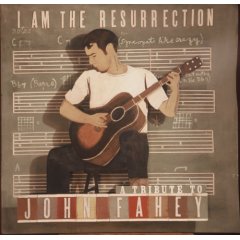
I Am the Resurrection: A Tribute to John Fahey is a tribute album to guitarist John Fahey released in 2006. The album's title is taken from the title of the third track of his album The Transfiguration of Blind Joe Death.
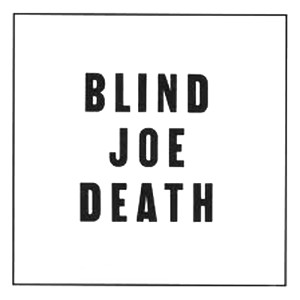
Blind Joe Death is the first album by American fingerstyle guitarist and composer John Fahey. There are three different versions of the album, and the original self-released edition of fewer than 100 copies is extremely rare.

John Aloysius Fahey was an American fingerstyle guitarist and composer who played the steel-string acoustic guitar as a solo instrument. His style has been enormously influential and has been described as the foundation of the genre of American primitive guitar, a term borrowed from painting and referring mainly to the self-taught nature of the music and its minimalist style. Fahey borrowed from the folk and blues traditions in American roots music, having compiled many forgotten early recordings in these genres. He would later incorporate 20th-century classical, Portuguese, Brazilian, and Indian influences into his work.

The Voice of the Turtle is the seventh album by American guitarist John Fahey. Recorded and released in 1968, it is considered one of his more experimental albums, combining not only folk elements, but shreds of psychedelia, early blues, country fiddles, ragas, and white noise. The album had many reissues with various track listings, jacket designs and mismatched titles.

The Yellow Princess is the ninth album by American folk musician John Fahey. Released in 1968, it was his second and last release on the Vanguard label.

Death Chants, Breakdowns & Military Waltzes is a 1963 album by American fingerstyle guitarist and composer John Fahey. Various sources show either a 1963 or 1964 original release. It was Fahey's second release and the first to gain a national distributor.

Fare Forward Voyagers is an album by American fingerstyle guitarist and composer John Fahey, released in 1973. It contains three songs, one comprising a complete side of the original LP.
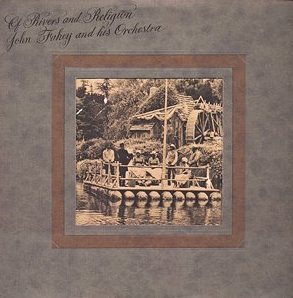
Of Rivers and Religion is an album by American folk musician John Fahey, released in 1972. It was his first recording on a major label and is credited to John Fahey and His Orchestra. It marked a significant change from Fahey's previous releases, incorporating a backing band and performing songs and arrangements in a Dixieland jazz style. Although Time picked it as one of the Top Ten albums of 1972, it was also a difficult album to market and had little enthusiasm at Reprise.

After the Ball is an album by the American folk musician John Fahey, released in 1973. It was his second and last recording on the Reprise label and like its predecessor, Of Rivers and Religion, it sold poorly.

The Best of John Fahey 1959–1977 is a compilation album by American fingerstyle guitarist and composer John Fahey, released in 1977. The songs are collected from four of Fahey's dozen or so releases up to that point.
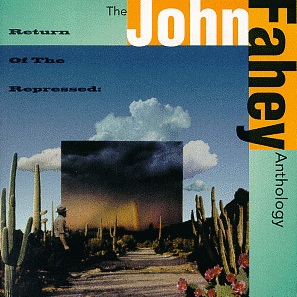
The Return of the Repressed: The John Fahey Anthology is a compilation album by American fingerstyle guitarist and composer John Fahey, released in 1994. Fahey's career, health and personal life had been in decline. The release of The Return of the Repressed, along with an article in Spin magazine by Byron Coley served to provide a renewal of his career.
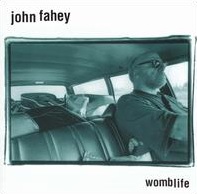
Womblife is an album by American fingerstyle guitarist and composer John Fahey, released in 1997. It was one of three releases by Fahey that year.

The Great Santa Barbara Oil Slick is a live album by American fingerstyle guitarist and composer John Fahey, released posthumously in 2004.

Railroad is an album by American fingerstyle guitarist and composer John Fahey, released in 1983. It was originally released as Railroad 1 by mistake. The Shanachie Records reissue is correctly labeled as Railroad. It was his last principal recording for Takoma Records, the label he founded in 1959.

Georgia Stomps, Atlanta Struts and Other Contemporary Dance Favorites is a live album by American fingerstyle guitarist and composer John Fahey, released in 1998. It was the second and last live album he recorded and released during his lifetime.
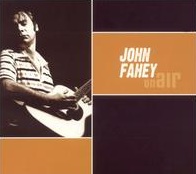
On Air is a live album by American fingerstyle guitarist and composer John Fahey, released posthumously in 2005.
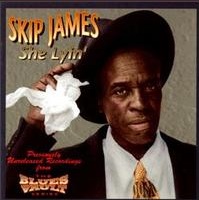
She Lyin' is the second studio album by American blues singer Skip James, recorded in 1964 and released in 1993. It was originally recorded for Takoma Records and was James' first recording since his rediscovery in 1964.

Your Past Comes Back to Haunt You: The Fonotone Years, 1958–1965 is the title of a box set compilation of recordings by American fingerstyle guitarist and composer John Fahey, released in 2011.




















